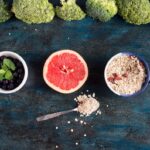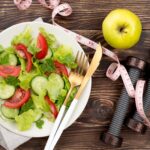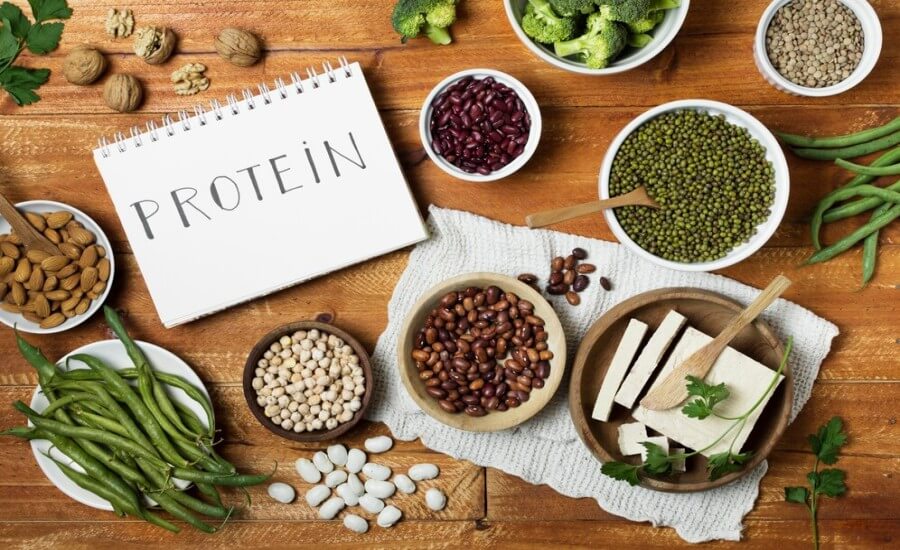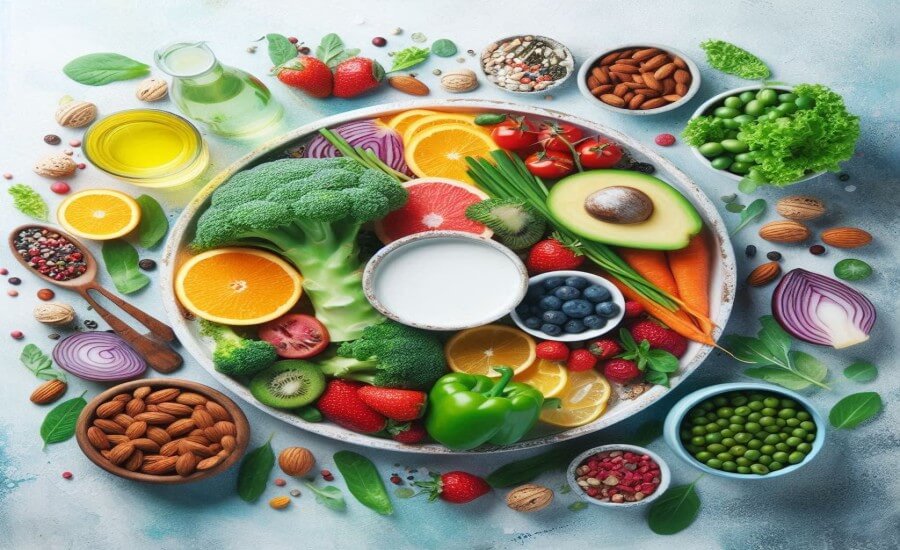While often discussed for weight loss, a vegan protein diet is a powerful and effective tool for achieving healthy vegan weight gain, building lean muscle, and boosting energy levels. Countering outdated myths about plant-based eating leading to frailty, this analysis explores how to strategically fuel your body with plants to meet weight gain and fitness goals. We’ll examine this through the lenses of nutritional science, ethical considerations, environmental impact, and practical application, providing a roadmap for thriving and getting stronger, the plant-powered way, right here from Siyol, Rajasthan, and beyond.
LENS 1: Nutritional Analysis – The Science of Plant-Powered Gains
Achieving healthy weight gain, particularly lean muscle mass, on any diet relies on fundamental principles: consuming more calories than you expend (caloric surplus) and providing adequate building blocks, especially protein. A vegan diet can easily meet these requirements with nutrient density.
- Caloric Surplus is Key: To gain weight, you need to consistently consume more calories than your body uses for daily activities and exercise. Focus on nutrient-dense calories rather than empty ones. Healthy fats and complex carbohydrates are efficient ways to increase calorie intake.
- Protein Powerhouse: Crucial for muscle repair and growth. Aim for approximately 1.6–2.2 grams of protein per kilogram of body weight per day if building muscle is a primary goal. Excellent vegan sources include lentils (dal), chickpeas (chana), beans (rajma), tofu, tempeh, seitan, edamame, quinoa, nuts, seeds (chia, hemp, pumpkin), and high-quality vegan protein powders (pea, soy, rice blends). While individual plant proteins might be lower in one or two essential amino acids, eating a variety of sources throughout the day ensures a complete amino acid profile.
- Fuel with Complex Carbs: Carbohydrates are the primary energy source, fueling workouts and replenishing glycogen stores. Choose whole grains (roti made from whole wheat or bajra, brown rice, oats), starchy vegetables (potatoes, sweet potatoes), fruits, and legumes over refined carbs.
- Harness Healthy Fats: Fats are calorie-dense (9 calories per gram vs. 4 for protein/carbs) and essential for hormone production (including testosterone, important for muscle growth) and overall health. Focus on avocados, nuts, nut butters, seeds, olives, and olive oil.
- Micronutrients Matter: Don’t neglect vitamins and minerals crucial for energy metabolism and muscle function:
- Iron: Needed for oxygen transport (legumes, spinach, fortified cereals – consume with Vit C).
- Zinc: Involved in protein synthesis and repair (legumes, nuts, seeds).
- Calcium & Vitamin D: Essential for bone health and muscle contraction (fortified plant milks, leafy greens, tofu for calcium; sunshine or supplements for Vit D).
- B12: Absolutely critical for energy metabolism and nerve function – must be supplemented or reliably obtained from fortified foods.
- Nutrient Timing: Consuming protein and carbohydrates around workouts (pre- and post-) can optimize recovery and muscle protein synthesis.
- Consider Creatine: One of the most researched supplements for strength and power. While the body produces some, vegans have lower baseline stores as it’s primarily found in meat. Supplementing with creatine monohydrate (vegan versions readily available) can enhance performance and muscle gain. What calorie-dense, healthy vegan foods can you easily add to your existing meals?
Nutritional Deep Dive: Vegan Protein Combining & Muscle Synthesis
The old myth of needing to meticulously combine specific plant proteins at every meal is outdated. Your body maintains a pool of amino acids. As long as you consume a variety of plant protein sources (legumes, grains, nuts, seeds, soy) throughout the day, your body can draw the necessary essential amino acids to synthesize muscle protein effectively. Focus on hitting your total daily protein goal with diverse sources. Leucine, a key amino acid for triggering muscle protein synthesis, is found in good amounts in soy, lentils, pumpkin seeds, and other plant sources.
Voice of Experience (Vegan Sports Dietitian): “Gaining healthy weight and muscle mass on a vegan diet is absolutely achievable and can be incredibly healthy. It requires strategic planning: ensuring a consistent calorie surplus from whole foods, prioritizing adequate protein from diverse plant sources spread throughout the day, and paying attention to key micronutrients like B12, Iron, Zinc, and Vitamin D. It’s about smart fueling, not deprivation.” – Riya Sharma, MSc, RD (Sports Nutrition)
LENS 2: Ethical Framework – Strength with Compassion
Pursuing weight gain or muscle building goals within a vegan framework adds ethical dimensions beyond just nutrition.
- Debunking Stereotypes: Successfully building a strong, healthy physique on a vegan diet challenges outdated stereotypes that equate plant-based eating with weakness. It demonstrates that vitality and physical prowess are achievable without contributing to animal exploitation.
- Healthful & Ethical Pursuit: It frames the pursuit of physical goals not just as aesthetic or performance-based, but as achievable in a way that aligns with ethical values of non-harming. This can add a layer of intrinsic motivation and satisfaction.
- Mindful Consumption: Even when aiming for a caloric surplus, an ethical lens encourages mindful choices – favouring whole foods over heavily processed options where possible, considering fair labor practices, and minimizing waste, contrasting with potentially less mindful “dirty bulking” approaches sometimes seen in fitness culture.
- Body Positivity & Intrinsic Goals: An ethical approach encourages focusing on health, strength, and personal goals rather than conforming solely to external pressures or potentially unhealthy body image standards prevalent in some fitness circles. How does achieving your fitness goals ethically enhance your sense of accomplishment?
Hidden Benefits: Inspiring Others
Achieving visible strength and health goals as a vegan can serve as powerful inspiration for others considering plant-based eating for ethical, environmental, or health reasons, showing them it doesn’t require sacrificing physical capability.
Voice of Experience (Vegan Bodybuilder): “For me, building muscle as a vegan is proof that you don’t need to harm animals to be strong. It aligns my physical pursuits with my core values. Every workout, every meal feels like a statement – strength through compassion. It’s about showing what’s possible, healthily and ethically.” – Arjun Mehta, Fitness Coach
Critical Reassessment: Health Over Numbers
While tracking calories and macros can be useful initially, it’s important to avoid obsessive tracking. Focus on overall health, energy levels, performance improvements, and how you feel, rather than solely fixating on the number on the scale or body measurements. Ensure goals remain health-promoting and personally meaningful.
LENS 3: Environmental Scientist’s Analysis – Sustainable Gains
Choosing to fuel weight gain and muscle building with plants offers significant environmental advantages compared to traditional animal-product-heavy bulking diets.
- Lower Footprint Protein: Producing protein from plants (legumes, soy, nuts, seeds, grains) requires vastly less land, water, and energy, and generates far fewer greenhouse gas emissions than producing the same amount of protein from meat, dairy, or eggs. Whey protein, a common supplement for muscle gain, carries the environmental footprint of dairy farming.
- Resource Efficiency: Plant-based diets place significantly less strain on natural resources. Gaining weight through calorie-dense plant foods like nuts, seeds, and avocados is far more resource-efficient than relying heavily on animal fats and proteins.
- Sustainable Supplement Choices: The rise of high-quality vegan protein powders (pea, soy, rice, hemp blends) offers environmentally friendlier alternatives to whey or casein supplements derived from the dairy industry.
- Water Conservation: From the arid context of Rajasthan to global water stress, the lower water footprint of plant-based foods is a critical advantage. Growing legumes or grains uses substantially less water than raising livestock. Does the lower environmental impact make plant-powered gains feel even more rewarding?
Market Transformation Map Suggestion: A bar chart showing the rapid growth trajectory of the vegan protein powder market segment compared to the more established whey protein market over the past 5-10 years.
Voice of Experience (Environmental Researcher): “From an environmental standpoint, sourcing calories and protein for weight gain or muscle building from plants versus animals makes a massive difference. The land use, water consumption, and greenhouse gas emissions associated with plant-based proteins are orders of magnitude lower. Choosing plant-powered gains is a direct contribution to a more sustainable food system.” – Dr. Isabella Rossi, Environmental Analyst
LENS 4: Everyday Practitioner’s Experience – Making Plant Gains Practical
Putting vegan weight gain into practice involves strategic eating, finding enjoyable high-calorie foods, and maintaining consistency.
- Calorie Boosting Strategies: Practitioners learn to easily increase calories by adding healthy fats (a drizzle of olive oil, a spoonful of nut butter, sliced avocado, handful of seeds) to meals, snacking on nuts and dried fruits, and incorporating calorie-dense smoothies.
- Meal Frequency & Size: Eating slightly larger portions or adding an extra meal or snack can help reach calorie goals without feeling overly full at any one time. Liquid calories (smoothies) can be easier to consume when appetite is low.
- Finding Favorite High-Protein Meals: Exploring recipes featuring lentils, beans, chickpeas, tofu, and tempeh helps ensure adequate protein intake becomes enjoyable and sustainable. Indian cuisine offers countless delicious options like dal makhani, chana masala, or tofu bhurji.
- Overcoming Challenges: Feeling too full initially, finding time for meal prep, navigating social situations where high-calorie vegan options might be limited, and countering myths from others (“Where do you get your protein?”) are common hurdles.
- Pairing with Training: Weight gain goals, especially muscle gain, require appropriate resistance training to signal the body to build muscle rather than just store fat. Diet and exercise work synergistically.
- Patience and Consistency: Healthy weight gain takes time. Practitioners emphasize the importance of being consistent with caloric surplus and training, and patient with the process. What’s one practical change you can make to increase your healthy calorie intake today?
Daily Impact: High-Calorie Vegan Meal Plan (Example)
- Breakfast: Large bowl of oatmeal cooked with fortified soy milk, mixed with 2 tbsp peanut butter, 1 tbsp chia seeds, sliced banana, and chopped nuts.
- Mid-Morning Snack: Large apple slices with a generous portion of almond butter OR a high-calorie smoothie (plant milk, vegan protein powder, banana, spinach, peanut butter/seeds).
- Lunch: Double portion of lentil dal with brown rice, a side of saag tofu (spinach and tofu), and a whole wheat roti with a drizzle of olive oil.
- Afternoon Snack: Handful of mixed nuts and dried fruits (raisins, dates) OR hummus with whole-grain crackers/vegetable sticks.
- Dinner: Large serving of chickpea curry (chana masala) with quinoa or potatoes, plus a large serving of steamed vegetables with added olive oil or tahini dressing.
- Before Bed (Optional): Small bowl of high-protein vegan yogurt with seeds, or a glass of fortified plant milk.
- Supplement: B12, Vitamin D, potentially Creatine and Algal Oil (EPA/DHA).
Voice of Experience (Individual who gained muscle vegan): “I was skinny and wanted to get stronger but stay vegan. It took learning to eat more – bigger portions, adding nuts and seeds everywhere, making calorie-dense smoothies. Consistency with food and lifting weights was key. It’s definitely possible, and I feel healthier and more energetic than ever.” – Vikram Choudhary, Software Engineer
Alternative Approaches: Focusing on Food Quality
While calorie surplus is necessary, focusing intensely on whole, unprocessed foods even during weight gain ensures the weight gained is healthier and provides maximum micronutrients, supporting overall well-being beyond just the scale.
PERSPECTIVE INTERSECTION MATRIX
- Nutrition & Practice: Nutritional science (Lens 1) dictates the need for caloric surplus and adequate protein, guiding the practical meal strategies (Lens 4) used by individuals.
- Ethics & Motivation: Ethical commitments (Lens 2) provide strong motivation for practitioners (Lens 4) to stick to plant-based methods (Lens 1) even when facing challenges or stereotypes.
- Environment & Choice: The significant environmental benefits (Lens 3) reinforce the choice for plant-based gains (Lens 1, 4) for ethically and environmentally conscious individuals (Lens 2).
- Practice & Science: Real-world experiences (Lens 4) often confirm the efficacy of nutritional principles (Lens 1) for vegan weight gain and highlight areas needing practical solutions (e.g., easily consumable calories).
- Debunking Myths: All perspectives contribute to debunking the myth that veganism leads to weakness, showcasing its viability for strength and healthy weight (Lens 1 science, Lens 2 ethics/vitality, Lens 3 sustainability, Lens 4 practical proof).
MISCONCEPTION ANALYSIS
| Misconception | Reality |
| It’s impossible/very hard to gain weight or muscle on a vegan diet. | Gaining weight requires a caloric surplus and adequate protein, both readily achievable with plant foods. Strategic planning makes it straightforward. Numerous vegan athletes and bodybuilders demonstrate its effectiveness. |
| Vegan protein sources are ‘incomplete’ or inferior for muscle gain. | Eating a variety of plant protein sources throughout the day provides all essential amino acids. Studies show plant protein supports muscle synthesis effectively when total protein intake is sufficient. |
| Vegan diets are too low in fat and calories for gaining weight. | Vegan diets can be rich in healthy, calorie-dense fats from nuts, seeds, avocados, and oils. Achieving a caloric surplus is easily managed with appropriate food choices and portion sizes. |
| You need meat for energy and strength to build muscle. | Complex carbohydrates from whole plant foods are the body’s primary energy source. Well-planned vegan diets provide ample energy. Strength comes from training and adequate nutrition, not specifically from meat. |
| Vegan ‘bulking’ is automatically unhealthy. | Like any diet, it depends on food choices. Focusing on whole, nutrient-dense plant foods ensures healthy weight gain. Relying solely on processed vegan junk food for calories would be unhealthy. |
KEY TURNING POINTS
- Rise of Visible Vegan Athletes: High-profile athletes across various sports (strength, endurance, bodybuilding) succeeding on vegan diets, providing powerful role models and debunking myths.
- Improved Vegan Protein Supplements: Development and mainstream availability of palatable, effective vegan protein powders (pea, soy, rice, hemp blends) offering convenient protein boosts.
- Scientific Validation: Increasing number of studies confirming that plant-based proteins can stimulate muscle protein synthesis similarly to animal proteins when consumed in adequate amounts.
- Growth of Vegan Fitness Communities: Online and offline communities providing support, information, and inspiration for plant-based fitness enthusiasts.
- Mainstream Acceptance: Greater awareness and acceptance of vegan diets within fitness and health circles, moving beyond niche status.
SYNTHESIS & RECOMMENDATIONS
Forget the myths: healthy vegan weight gain and muscle building are not only possible but can be achieved effectively, ethically, and sustainably. The keys lie in applying fundamental nutritional principles: creating a consistent caloric surplus through nutrient-dense whole foods, ensuring adequate protein intake from diverse plant sources, fueling with complex carbohydrates and healthy fats, and paying attention to crucial micronutrients like Vitamin B12. Combined with appropriate resistance training, a well-planned vegan diet can power your gains, boost your energy, and help you thrive while aligning with ethical and environmental values.
Recommendations:
- Calculate & Track (Initially): Determine your calorie needs for a moderate surplus (e.g., 300-500 calories above maintenance) and track intake initially to ensure you’re meeting targets.
- Prioritize Protein: Aim for 1.6-2.2g protein/kg body weight daily, spread across meals, using sources like legumes, tofu/tempeh, nuts, seeds, and optionally, vegan protein powder.
- Embrace Healthy Fats: Add nuts, seeds, avocados, and healthy oils to meals to boost calories and support hormone health.
- Fuel with Complex Carbs: Choose whole grains, fruits, and starchy vegetables for sustained energy.
- Eat Regularly: Consider 3 main meals and 2-3 calorie-dense snacks or smoothies to meet calorie needs without excessive fullness.
- Supplement Smartly: B12 is essential. Consider Vitamin D, Algal Oil (EPA/DHA), and potentially Creatine based on individual needs and goals.
- Train Appropriately: Combine your diet with progressive resistance training to stimulate muscle growth.
- Be Patient & Consistent: Healthy weight gain takes time and consistent effort in both diet and training.
FURTHER AREAS OF EXPLORATION
- Detailed Guide to Vegan Protein Powders (Types, Brands, Uses)
- Vegan Meal Prep Strategies for Bulking/Weight Gain
- Micronutrients of Concern for Vegan Athletes (Iron, Zinc, Iodine, Calcium)
- Vegan Diet and Hormone Health (Testosterone, Estrogen)
- Overcoming Appetite Challenges When Aiming for Caloric Surplus
- Traditional Indian High-Protein Vegan Recipes for Muscle Gain












